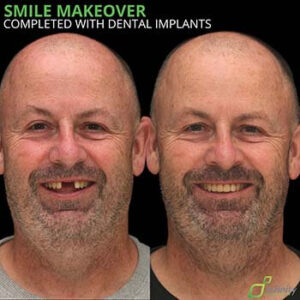So, how long do dental implants last?
The short answer is somewhere between 10 and 30 years. However, many factors can indicate how little or how long a dental implant lasts. Factors like:
- The skills and experience of the dentist
- The type of dental implants used
- The patient’s lifestyle choices/habits
- The patient’s medical condition
- Standards of oral care
all play a part in dictating how long dental implants will last.
Let’s take each point in turn and elaborate.
Firstly, the skill of the implant dentist
While there are specialists who place dental implants, general dentists can also fit them too. It doesn’t matter if you choose a specialist dentist or a general dentist, so long as the dentist in question is experienced in implant surgery.

The problem is that no two cases are ever the same. The dentist should be knowledgeable enough to be able to adapt should circumstances change during the procedure.
In addition, an experienced implant dentist will also be able to tell the right time to fit the dental crown.
If the dentist places the dental crown before the implant has fully stabilised in the jaw, then implant longevity will be minimal, so the timing must be correct.
As a top tip, don’t be afraid to ask a dentist how much experience they have with dental implants. Any dentist worth their salt will be happy to answer that question.
The type of dental implants used
Let’s say that there are dental implants, and then there are dental implants! Unfortunately, not all implants are equal.
Cheaper non-branded implants don’t have the financial backing and years of clinical testing behind them. Inferior metals are sometimes used in some of the bargain-basement brands as decreased manufacturing costs is how they drive down the unit price.
It could mean that the lesser dental implant isn’t as durable as its branded counterpart for the patient, resulting in a dental implant only lasting a fraction of the time it’s supposed to.
Top tip – Do your research on quality dental implant brands then, ask the dentist what dental implant brand they use. If it’s looking like the dentist is using a cheap or inferior brand, you may want to choose another dentist.
Lifestyle choices and habits
Believe it or not, one factor that may indicate how long a dental implant lasts is the lifestyle choices that the patient makes.
Did you know, for instance, that smoking can jeopardise the lifespan of a dental implant? Research shows that smoking can increase complications and reduce the success rate of dental implant surgery.
When peri-implant tissue is exposed to tobacco smoke, patients are at an increased risk of implant failure.
Why? Because tobacco smoke carries millions of bacteria.
Bacteria-laden smoke can attack the gum tissue surrounding the newly placed implant when inhaled.
Moreover, nicotine is known to slow down the osseointegration (bone fusion) process and, in some cases, prevent it from happening at all.
Excess alcohol can slow down the body’s ability to grow bone tissue. So if you are prone to more than the odd drink and smoke a lot, you carry a risk of dental implant failure.
Because of these factors, your dentist will ask you to quit smoking altogether and cut down significantly on your alcohol intake for the duration of your treatment.
Medical condition
In addition to lifestyle choices, certain medical conditions can also be detrimental to implant surgery, conditions like uncontrolled diabetes, for example.
Similar to smoking, a patient with uncontrolled diabetes may develop problems when it comes to bone fusion. Rather than chemicals contained in tobacco smoke, this time, it’s blood sugar levels that wreak havoc with tissue growth. Erratic sugar levels lead to deficient mineralisation. Low mineralisation means the possibility of delayed or lesser bone fusion. Either way, it’s not good news for dental implant longevity.
So how long do dental implants last, really!
Here’s what we know.

However, between 1965 and 1990, only a fraction of the millions of dental implants placed today were carried out. So we are unable to tell for sure whether any placed after 1990 will last this long.
Dentists, therefore, tend to err on the side of caution when asked how long dental implants last and a conservative figure of 10-30 years is usually mentioned.
Even this might not be right for your circumstances. One thing is for sure; however, when a patient commits to dental implant surgery, they need to commit to a lifetime of implant care.
Proper brushing and flossing and regular dental check-ups can prolong the life of a dental implant not just for several weeks or months but for years.
Any dentist will tell you that you could have the best dental surgeon in the world fit your dental implants, but if you can’t provide regular ongoing care, then it’s highly likely that your implants will fail.
So there you have it; all you need to know about how long dental implants last.
Dental Implants are the gold standard of missing teeth replacement for a reason. So while you may have to put in a bit of leg work to care for them as you would your own teeth, most people would say that they are worth it in the long run.
If you would like to know more about the dental implant procedure, or you are curious about getting dental implants, contact the team at Infinity Dental Care. We’re a highly experienced team of dental professionals who have fitted countless dental implants.
Schedule a smile consultation with Dr Jack Yang and his team to see what they can do for you. Call us now on (02) 9159 6237.
Note: Any surgical or invasive procedure carries risks. Before proceeding, you should seek a second opinion from an appropriately qualified health practitioner.

